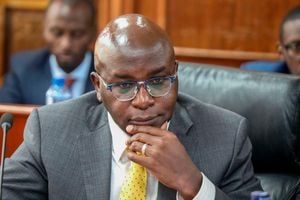
A man is arrested for demonstrating outside the National Treasury ahead of the delivery of the 2023/2024 budget statement.
The International Monetary Fund (IMF) has declared new taxes proposed by the Treasury inadequate, setting the stage for friction between Kenya and the multilateral lender.
The IMF reckons the slew of taxes on betting, phone calls and data will raise an extra Sh145 billion against requirements of an estimated Sh209 billion, leaving a funding gap of about Sh64 billion.
The Treasury is bringing back some tax measures that it scrapped after deadly protests in June following tough conditions set by the IMF, raising the risk of fresh round unrest.
“The authorities plan to offset spending pressures that have emerged since the adoption of the supplementary in July through new revenue measures, with any residual gap to be closed through spending adjustments in a second Supplementary to preserve the primary balance target,” the IMF notes.
The lender, however, observes that while the new taxes seek to offset spending pressures and reduce debt vulnerabilities, the targeted revenues are insufficient to match the expenses the government faces.
“In view of the spending pressures, the authorities have submitted to Parliament a tax laws amendment bill with new revenue measures amounting to 0.9 per cent of GDP, including rationalising selected VAT expenditures, increasing and realigning excise duties on selected goods and services, and increasing specific levies on imports.
“However, these measures will not be sufficient to offset the new spending pressures and clearance of the spending carryovers from FY2023/24, necessitating further measures to preserve the primary balance target,” the IMF says.
According to the lender, spending pressures are the product of the government yielding to demands from workers in the security sector, teachers and civil servants for higher salaries as well as the push for more billions to fund universities and vocational training institutes total about Sh209 billion.
“However, spending measures are subject to considerable risks as pressures are already materialising. Risks include a reversal of top-down across-the-board spending cuts as spending pressures emerge. Indeed, while the supplementary included a small provision for agreed CBAs, the government has agreed to demands from the security sector, teachers, and civil servants to honour the CBAs, leading to wage bill pressures of more than 0.1 per cent of GDP that more than offset the envisaged wage bill savings.
“Other pressures from the education and security sectors, including for the funding of universities and technical and vocational training, amounting to 0.3 per cent of GDP will also need to be accommodated. Together with the clearance of the spending carryover from FY2023/24, spending pressures amount to some 1.3 per cent of GDP (Sh209billion),” the IMF says. IMF wants Kenya to increase tax collections in effort to reduce borrowing, arguing that the country under-performed on revenues and breached conditions of its multi-billion shilling loans, including the tranche of Sh78.3 billion ($606.1 million) approved Thursday.
It remains to be seen how people who were involved in the youth-led protest movement that rocked Kenya in June will react to the revived taxes amid fears they could go back onto the streets.
Some of the proposed taxes in the withdrawn finance bill included raising levies on essentials such as bread and diapers.
The government is caught between competing demands of hard-pressed citizens and of lenders such as the IMF, which is urging it to cut deficits to obtain more financing.
The Treasury has proposed to raise excise duty on internet and telephone calls to 20 per cent from the current 15 per cent, setting the stage for an upward revision of the prices telcos charge for these services. The proposal in the finance bill, which sought to have operators of digital marketplaces such as food delivery and ride-hailing services pay a withholding tax at the rate of five per cent for resident payments and 20 per cent for non-resident payments is also back.
Ride-hailing services, online freelance jobs, and food delivery firms face a steeper six per cent tax as Treasury revived a proposal to raise revenue via the sources.
Wine prices are expected to rise while that of beer would drop in fresh proposals to set excise duty on beverages based on their respective alcohol contents by volume.
The Treasury has also reinstated plans to impose a five per cent withholding tax on interest earned from infrastructure bonds with tenures of at least three years.
President William Ruto abandoned the finance bill for this fiscal year on June 26.
The bill had contained new taxes and hikes to raise an extra Sh346 billion--levies that the protesters fretted would hit workers struggling with surging living costs and negative real wages.
After the bill was dropped, the government cut spending and widened the fiscal deficit to the chagrin of the IMF.
In a letter to IMF Managing Director Kristalina Georgieva, Treasury CS Mbadi and CBK Governor Kamau Thugge indicated that the government planned to address remaining gaps through the second supplementary budget, expected in January 2025.
“As spending pressures have already materialised, we are committed to preserving the primary balance target by implementing new revenue measures through a tax laws amendment bill, and further prioritizing and rationalising spending through a Supplementary II FY2024/25 Budget to close any residual gap,” the October 18, 2024 letter stated.











